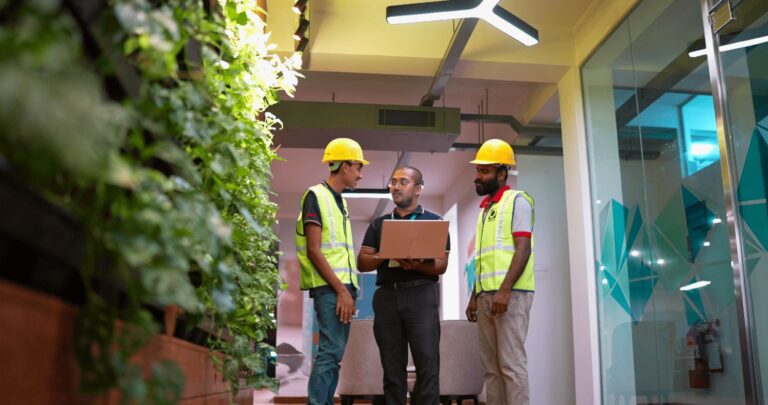Proper ventilation is crucial for maintaining a safe and healthy working environment in Sri Lankan industrial facilities. Effective ventilation systems control temperature, remove contaminants, and ensure adequate air exchange, contributing to the overall well-being of employees and the efficiency of operations. Here’s an in-depth look at the role of ventilation systems in industrial settings.
Air Quality Control Ventilation systems are essential for controlling indoor air quality. They help remove airborne contaminants, such as dust, fumes, and chemical vapors, that can pose health risks to workers. By ensuring a constant supply of fresh air, ventilation systems reduce the concentration of pollutants and create a healthier work environment.
Temperature Regulation In industrial facilities, processes and machinery can generate significant amounts of heat. Ventilation systems help regulate indoor temperatures by exhausting hot air and bringing in cooler air. This is particularly important in Sri Lanka’s tropical climate, where maintaining a comfortable working environment is challenging.
Humidity Control High humidity levels can lead to mold growth and equipment corrosion, compromising the safety and efficiency of industrial operations. Ventilation systems help control humidity levels by facilitating air exchange and preventing moisture buildup. This is crucial for maintaining the integrity of products and machinery.
Occupational Health and Safety Proper ventilation is a key component of occupational health and safety. It helps prevent the buildup of hazardous gases and ensures that workers have access to clean, breathable air. Compliance with health and safety regulations often requires effective ventilation systems to protect employees from respiratory issues and other health hazards.
Energy Efficiency Modern ventilation systems are designed to be energy-efficient, reducing the overall energy consumption of industrial facilities. Features such as variable-speed drives, energy recovery ventilators, and smart controls optimize airflow and minimize energy use. This not only lowers operational costs but also contributes to environmental sustainability.
Enhanced Productivity A well-ventilated work environment can significantly enhance employee productivity. Proper ventilation reduces the risk of heat stress, fatigue, and respiratory problems, ensuring that workers can perform at their best. Improved air quality and temperature control create a more comfortable and conducive working environment.
Compliance with Regulations Many industries have strict regulations regarding indoor air quality and ventilation. Installing and maintaining proper ventilation systems ensures compliance with these regulations, avoiding potential fines and legal issues. It also demonstrates a commitment to employee well-being and environmental responsibility.
Types of Ventilation Systems There are various types of ventilation systems used in industrial facilities, including natural ventilation, mechanical ventilation, and hybrid systems. Each type has its advantages and applications, depending on the specific needs and layout of the facility.
In conclusion, ventilation systems play a vital role in maintaining safe, healthy, and efficient industrial facilities in Sri Lanka. By controlling air quality, temperature, and humidity, these systems enhance the well-being of employees, protect equipment, and ensure compliance with regulations, ultimately contributing to the overall success of industrial operations.
Proper ventilation is crucial for maintaining a safe and healthy working environment in Sri Lankan industrial facilities. Effective ventilation systems control temperature, remove contaminants, and ensure adequate air exchange, contributing to the overall well-being of employees and the efficiency of operations. Here’s an in-depth look at the role of ventilation systems in industrial settings.
Air Quality Control Ventilation systems are essential for controlling indoor air quality. They help remove airborne contaminants, such as dust, fumes, and chemical vapors, that can pose health risks to workers. By ensuring a constant supply of fresh air, ventilation systems reduce the concentration of pollutants and create a healthier work environment.
Temperature Regulation In industrial facilities, processes and machinery can generate significant amounts of heat. Ventilation systems help regulate indoor temperatures by exhausting hot air and bringing in cooler air. This is particularly important in Sri Lanka’s tropical climate, where maintaining a comfortable working environment is challenging.
Humidity Control High humidity levels can lead to mold growth and equipment corrosion, compromising the safety and efficiency of industrial operations. Ventilation systems help control humidity levels by facilitating air exchange and preventing moisture buildup. This is crucial for maintaining the integrity of products and machinery.
Occupational Health and Safety Proper ventilation is a key component of occupational health and safety. It helps prevent the buildup of hazardous gases and ensures that workers have access to clean, breathable air. Compliance with health and safety regulations often requires effective ventilation systems to protect employees from respiratory issues and other health hazards.
Energy Efficiency Modern ventilation systems are designed to be energy-efficient, reducing the overall energy consumption of industrial facilities. Features such as variable-speed drives, energy recovery ventilators, and smart controls optimize airflow and minimize energy use. This not only lowers operational costs but also contributes to environmental sustainability.
Enhanced Productivity A well-ventilated work environment can significantly enhance employee productivity. Proper ventilation reduces the risk of heat stress, fatigue, and respiratory problems, ensuring that workers can perform at their best. Improved air quality and temperature control create a more comfortable and conducive working environment.
Compliance with Regulations Many industries have strict regulations regarding indoor air quality and ventilation. Installing and maintaining proper ventilation systems ensures compliance with these regulations, avoiding potential fines and legal issues. It also demonstrates a commitment to employee well-being and environmental responsibility.
Types of Ventilation Systems There are various types of ventilation systems used in industrial facilities, including natural ventilation, mechanical ventilation, and hybrid systems. Each type has its advantages and applications, depending on the specific needs and layout of the facility.
In conclusion, ventilation systems play a vital role in maintaining safe, healthy, and efficient industrial facilities in Sri Lanka. By controlling air quality, temperature, and humidity, these systems enhance the well-being of employees, protect equipment, and ensure compliance with regulations, ultimately contributing to the overall success of industrial operations.
MONARCH LANKA ENGINEERING (PVT) LTD is the best place for industrial AC and ventilation services in Sri Lanka. They provide top-quality ventilation systems designed to meet the specific needs of industrial environments.


